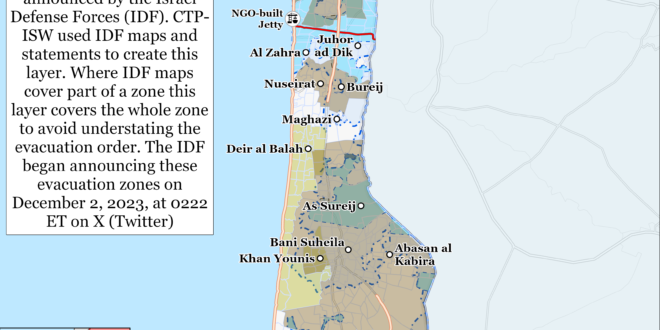The factors seemingly driving Iran to delay its direct attack on Israel are temporary. These factors will disappear with time, which would increase the likelihood of an Iranian attack on Israel. These factors include ongoing ceasefire-hostage talks between Israel and Hamas, the US-Israeli deterrent posture, and internal Iranian coordination and planning. These factors are not mutually exclusive; the delay in Iran’s retaliation for Israel killing Hamas political leader Ismail Haniyeh could be caused by any combination of these factors. Iranian officials have suggested that Iran is delaying its retaliation to account for ceasefire-hostage talks. US President Joe Biden likewise said that he expected Iran to delay or indefinitely postpone an attack on Israel if a ceasefire-hostage deal was reached.[1] The United States explicitly communicated to Iran that Israel would mount a major military response to an Iranian attack targeting Israel, while Israel has practiced aerial refueling fighter jets to simulate “long-range flights deep into enemy territory.”[2] Iran lastly seeks to calibrate its attack on Israel in order to establish deterrence while avoiding a major war. Iran could also use the delay to plan and coordinate the strike with other, external partners and stakeholders both inside and outside the Axis of Resistance. The factors described here will not persist indefinitely, meaning that Iran will have fewer reasons to continue delaying attack over time.
The implication by US officials that the US deterrent posture in the Middle East decreases the risk of an Iranian attack would simultaneously imply that changing or removing the US deterrent posture increases the risk of an Iranian attack. The Pentagon deputy press secretary said that the arrival of the USS Abraham Lincoln carrier strike group (CSG) to the Middle East sends a “very powerful message of deterrence,” adding that she cannot predict how long the Abraham Lincoln CSG will stay in the region but that the United States is “well-postured” to defend Israel.[3] It is far from clear that the Abraham Lincoln CSG or the arrival of other US military assets–including F22 stealth fighters and the USS Georgia guided missile submarine–the region deterred Iran, however.[4] To the extent that Iranian calculus is, in fact, affected by the US military posture in the region, the Pentagon’s statements imply that changing or removing that posture would increase the likelihood of an Iranian attack.
Maintaining the US deterrent posture in the region is possible but would be tantamount to a shift in US global priorities that is inconsistent with the 2022 National Defense Strategy (NDS). The 2022 NDS identifies China as the “most comprehensive and serious challenge to US national security,” Russia as an “acute threat,” and Iran as only a “persistent” threat.[5] Two of the four NDS defense priorities are “deterring strategic attacks against the United States” and its partners and “deterring aggression, while being prepared to prevail in conflict when necessary, prioritizing” the challenges posed by China and Russia.[6] Maintaining the current deterrent posture in the Middle East indefinitely would mean de-facto deprioritizing establishing deterrence vis-a-vis China or Russia. There are currently no US CSGs in the Western Pacific as of August 23, 2024, for example, while two CSGs are in the Middle East.[7]
Newly appointed Iranian Foreign Affairs Minister Abbas Araghchi reiterated in separate phone calls with his French and UK counterparts on August 23 that Iran maintains the right to attack Israel in response to Israel killing Ismail Haniyeh.[8] Araghchi told British Foreign Secretary David Lammy that Iran does not want to expand the war or increase regional tensions.
Israeli Defense Minister Yoav Gallant and US Secretary of Defense Lloyd Austin discussed regional developments in a phone call on August 22.[9] Gallant and Austin discussed attacks on the Israel-Lebanon border and the threats that Iran, Lebanese Hezbollah, and other Iranian-backed militias pose to Israel. Austin said that the United States will continue to monitor Iranian attack planning and added that the United States is prepared to defend Israel in the case of an attack. Austin also highlighted the importance of securing a hostage and ceasefire deal between Israel and Hamas.
Palestinian sources told Israeli media that Hamas has decided to begin targeting Israeli civilians abroad, possibly due to Hamas’ decreasing ability to conduct attacks into Israel.[10] Hamas has historically targeted Israeli civilians to impose costs on Israel for operations against Hamas. Unspecified Palestinian sources told Israeli Channel 12 that Hamas took a “strategic decision” to attack Israelis abroad to avenge the death of Ismail Haniyeh in Tehran. Hamas may made this decision because Israeli operations have destroyed the bulk of Hamas’ rocket supply.[11] The loss of this rocket supply and improved Israeli preventative measures over the last three decades that have made the use of suicide bombers within Israel impractical and less effective means that the two tactics Hamas has historically used are decreasingly viable.[12] Hamas could collaborate with Iran to threaten Israeli civilians abroad, given that Iran has invested tremendously in building covert attack networks abroad that could be used to target Israelis.
Unspecified Hamas officials said that Hamas has rejected multiple elements of the latest US bridging proposal. Israeli officials said that there was “significant progress” after ceasefire-hostage talks in Cairo and that Egypt is prepared to give Hamas the latest proposal.[13] Two Hamas sources, however, told Reuters that the US bridging proposal does not include a permanent ceasefire and that it includes “changes [that Hamas] rejects,” including allowing an Israeli military presence “at the crossings” and the stipulation that freed Palestinian prisoners go into exile instead of returning to the Gaza Strip or West Bank.[14] Two Egyptian security officials emphasized that Israel and Hamas appeared willing to resolve all differences except the issue of an Israeli withdrawal, presumably from the Netzarim and Philadelphi corridors in particular.[15] Israeli Prime Minister Benjamin Netanyahu has not changed his position on the need for Israeli control of the Philadelphi Corridor, and his office has stated that the “achievement of all of Israel’s objectives for the war requires securing” the Philadelphi Corridor.[16]
Some Iranian-backed Iraqi militias told Iraqi Prime Minister Mohammad Shia al Sudani that they would refrain from attacking US forces for the moment, according to an adviser to the Iraqi federal government speaking to Lebanese media.[17] Sudani has reportedly tried to deescalate between the United States and the militias in recent days.[18] Sudani also reportedly requested that the United States refrain from attacking militia positions in exchange for the militias pausing their attacks targeting US forces.[19] This mediation comes after the militias injured five US personnel in a rocket attack in Iraq on August 5.[20] CTP-ISW is considering the hypothesis that Iran is restraining its Iraqi militias while planning its retaliation for Israel killing Ismail Haniyeh in Tehran. Iranian-backed Iraqi militias have messaged that they intend to soon resume attacks, however. A leader of the Islamic Resistance in Iraq, Ali Hussein, denied that the militias have agreed to pause attacks targeting US forces.[21] CTP-ISW has similarly reported in recent days that the militias have begun threatening to resume attacks targeting US forces in order to expel the United States from the Middle East.
Unknown gunmen shot and killed the deputy police chief for security of Khash City, Sistan and Baluchistan Province, Iran, on August 23.[22] Unknown gunmen killed officer Hossein Piri near his house after he attended Friday prayer services. Iranian state media blamed unspecified “terrorists” for the attack. Piri was dressed in civilian clothing in broad daylight, suggesting that the attack was a targeted killing. CTP-ISW has previously noted an uptick in anti-regime militancy and unrest in southeastern Iran and the increasingly precarious internal security situation there.
Key Takeaways:
- Iranian Retaliation: The factors seemingly driving Iran to delay its direct attack on Israel are temporary. These factors will disappear with time, which would increase the likelihood of an Iranian attack on Israel. These factors include ongoing ceasefire-hostage talks between Israel and Hamas, the US-Israeli deterrent posture, and internal Iranian coordination and planning.
- Deterring an Iranian Retaliation: The implication by US officials that the US deterrent posture in the Middle East decreases the risk of an Iranian attack would simultaneously imply that changing or removing the US deterrent posture increases the risk of an Iranian attack. To the extent that Iranian calculus is, in fact, affected by the US military posture in the region, recent statements by Pentagon officials imply that changing or removing that posture would increase the likelihood of an Iranian attack. Maintaining the US deterrent posture in the region is possible but would be tantamount to a shift in US global priorities that is inconsistent with the 2022 National Defense Strategy (NDS).
- Hamas External Operations: Palestinian sources told Israeli media that Hamas has decided to begin targeting Israeli civilians abroad, possibly due to Hamas’ decreasing ability to conduct attacks into Israel.
- Gaza Strip Ceasefire: Unspecified Hamas officials said that Hamas has rejected multiple elements of the latest US bridging proposal.
- Iraq: Some Iranian-backed Iraqi militias told Iraqi Prime Minister Mohammad Shia al Sudani that they would refrain from attacking US forces for the moment, according to an adviser to the Iraqi federal government speaking to Lebanese media.
- Iran: Unknown gunmen shot and killed the deputy police chief for security of Khash City, Sistan and Baluchistan Province, Iran, on August 23.
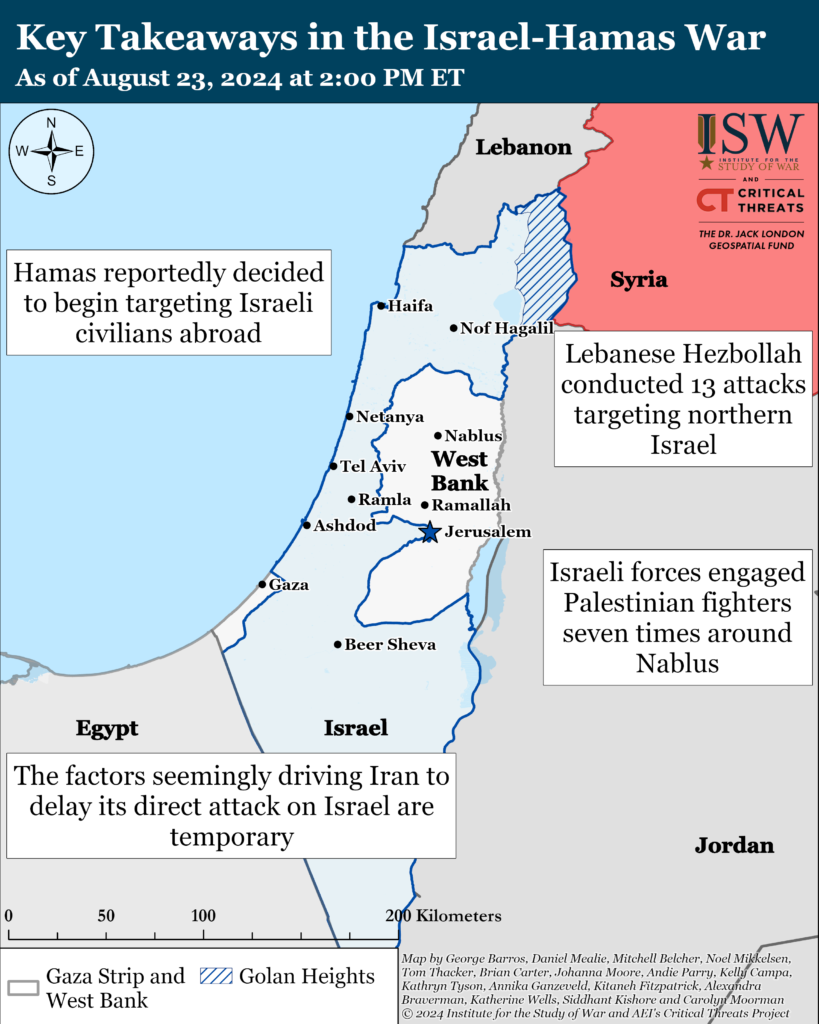
Gaza Strip
Axis of Resistance objectives:
Erode the will of the Israeli political establishment and public to sustain clearing operations in the Gaza Strip
Reestablish Hamas as the governing authority in the Gaza Strip
The IDF Air Force (IAF) conducted airstrikes targeting a Hamas command center inside former school in Zaytoun on August 23.[23] The IDF said that Hamas used the school to store weapons and shelter fighters to conduct attacks in the area.[24] The IDF said that it took steps to reduce harm to civilians in the area before the airstrikes.
Palestinian militias claimed several attacks targeting Israeli forces south of Zaytoun, presumably in or near the Netzarim Corridor, on August 23. The al Aqsa Martyrs’ Brigades mortared Israeli forces south of Zaytoun.[25] Hamas engaged Israeli forces in southern Zaytoun.[26] Palestinian Islamic Jihad (PIJ) fired mortars and small arms targeting Israeli forces in the same area.[27]
The IDF 252nd Division operated along the Netzarim Corridor on August 23. The IDF killed a Palestinian fighter who was carrying explosives near the corridor.[28] The IDF also struck a rocket launch position used to attack Israeli forces in the area. Hamas claimed that it conducted a drone attack targeting an Israeli command and control headquarters along the corridor on August 22.[29] The last Hamas drone attack targeting Israeli forces was on August 15.[30]
The IDF 98th Division continued advancing deeper into Khan Younis and into the outskirts of Deir al Balah on August 23 to conduct clearing operations.[31] Israeli forces killed dozens of fighters and destroyed militia infrastructure in the area. The IAF also conducted an airstrike and killed a fighter who ”posed a threat” to Israeli forces.[32]
The 162nd Division continued clearing operations in Tal al Sultan, Rafah, on August 23. The IDF said that it has killed dozens of Palestinian fighters in Tal al Sultan over the past day.[33]
Israeli forces destroyed a one-kilometer-long underground tunnel in Rafah over the past week.[34] The IDF said that it located explosive devices, electrical infrastructure, and blast-proof doors in the tunnel. The IDF also reported that it has observed Hamas fighters using the tunnel over the past several weeks to conduct attacks targeting Israeli forces in the area.
The IAF conducted airstrikes against approximately 30 targets across the Gaza Strip over the past day.[35] The IAF struck military posts and compounds and weapons depots in the Gaza Strip, as well as launch sites in Khan Younis.[36]
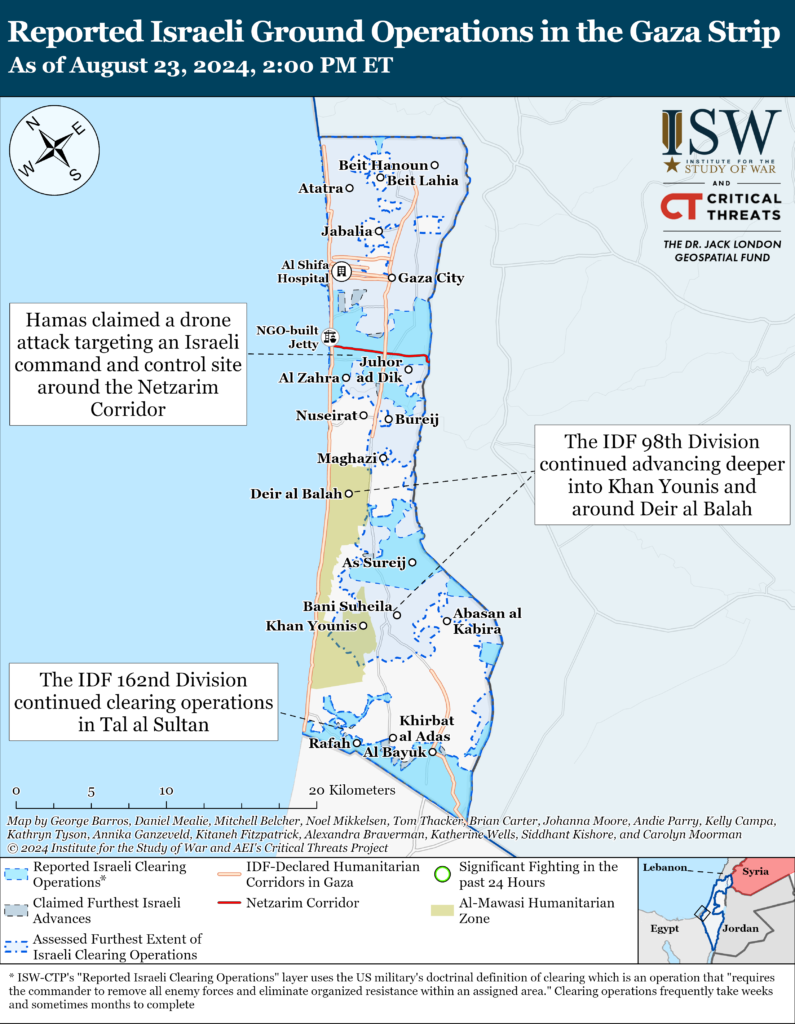
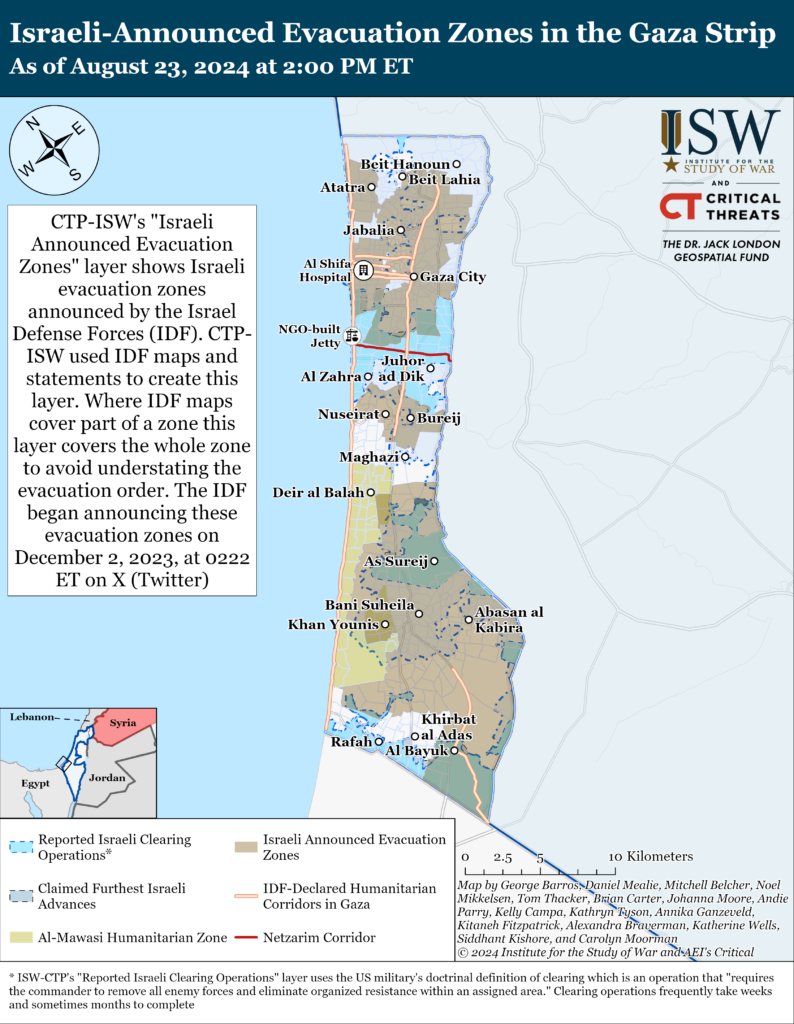
Palestinian militias conducted at least five indirect fire attacks from the Gaza Strip into Israel on August 23.[37] The al Aqsa Martyrs’ Brigades, PIJ, and the Salah al Din Brigades conducted a combined mortar attack targeting Israeli forces in Kissufim.[38] PIJ separately fired mortars targeting Israeli forces in Zikim.[39] PIJ also launched rocket targeting Ashkelon, Ashdod, and unspecified Israeli towns near the Gaza Strip.[40] The IDF intercepted one rocket over Sderot, and a second rocket fell in an open area.[41]
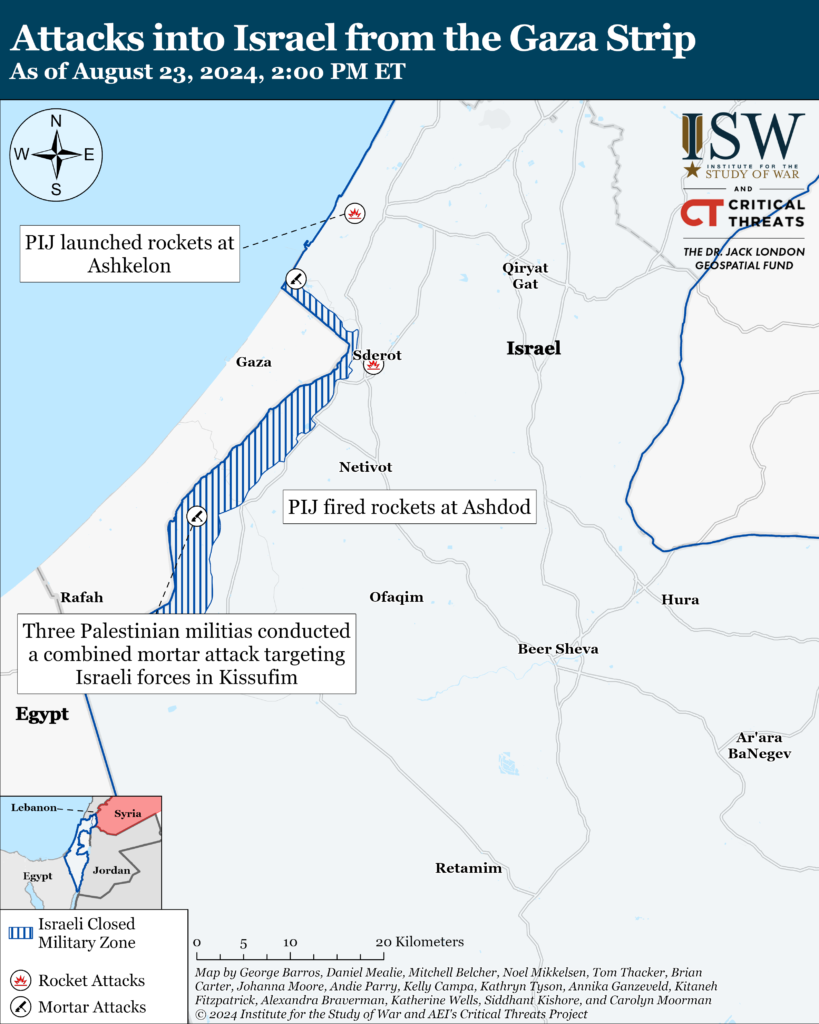
West Bank
Axis of Resistance objectives:
Establish the West Bank as a viable front against Israel
Israeli forces have engaged Palestinian fighters in several areas of Nablus City and Refugee Camp since CTP-ISW’s last data cutoff on August 22.[42] The al Aqsa Martyrs’ Brigades fired small arms and detonated improvised explosive devices (IEDs) targeting Israeli forces in Nablus’ old city and two refugee camps.[43] Palestinian security forces separately uncovered and detonated several IEDs planted by unspecified Palestinian fighters south of Tubas, on August 23.[44]
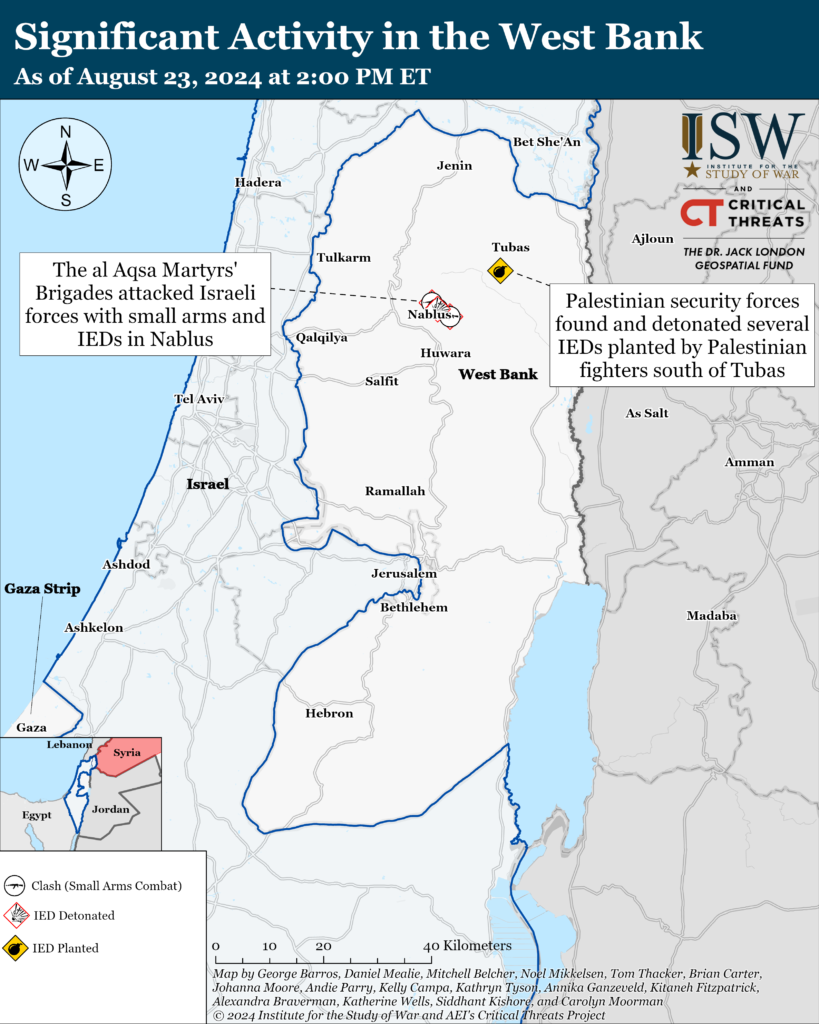
Southern Lebanon and Golan Heights
Axis of Resistance objectives:
Deter Israel from conducting a ground operation into Lebanon
Prepare for an expanded and protracted conflict with Israel in the near term
Expel the United States from Syria
Lebanese Hezbollah has conducted at least 13 attacks from southern Lebanon into northern Israel since CTP-ISW’s last data cutoff on August 22.[45] Hezbollah rocket fire struck near a major Israeli air defense site on Mount Meron on August 23.[46] Israeli Army Radio reported that the air defense system remains fully functional.[47] Hezbollah also fired about 20 rockets targeting the IDF Northern Command headquarters in Safed.[48]
The IDF Air Force struck and killed two members of Hezbollah’s rocket and missile unit in southern Lebanon on August 23.[49] The IDF called one of the fighters a ”prominent member” of the unit.[50] Hezbollah mourned the fighters but did not identify their roles in Hezbollah.[51]
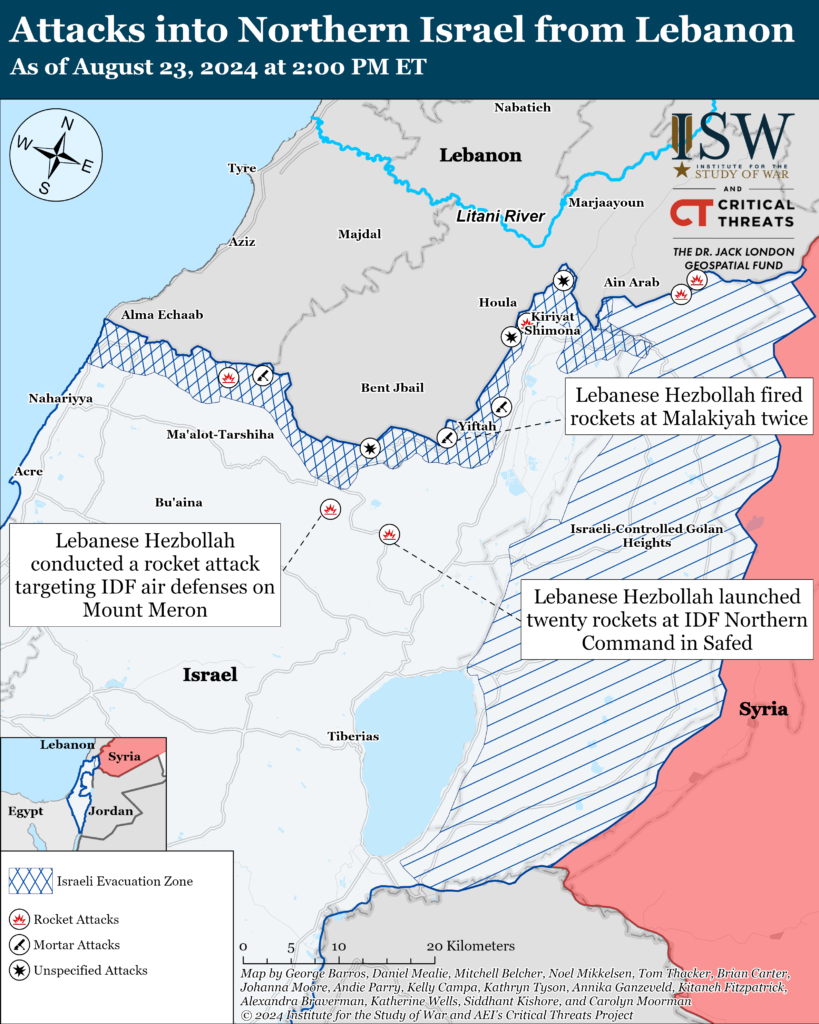
Iran and Axis of Resistance
The IDF reportedly conducted airstrikes targeting sites in the countryside of Hama and Homs Provinces.[52] A Syrian analyst claimed that the IDF struck Western Homs.[53] He also claimed that the IDF struck three sites in Hama Province, including 47th Syrian Arab Army Brigade ammunition depots south of Hama City and other unspecified locations near the town of Khattab. The Syrian Ministry of Defense claimed that Israeli aircraft over northern Lebanon launched the munitions and that the strikes injured seven civilians.[54]
US Central Command (CENTCOM) intercepted two Houthi drones over the Red Sea on August 22.[55] CENTCOM also destroyed a drone in Houthi-controlled areas of Yemen. CENTCOM determined that the Houthi drones presented a clear and imminent threat to US and coalition forces and merchant vessels in the region.
Newly appointed Iranian Foreign Affairs Minister Abbas Araghchi held several phone calls with his foreign counterparts on August 22 and August 23. Araghchi spoke with the European Union’s foreign affairs and security policy representative, and the Iraqi, German, Armenian, Syrian, and Lebanese foreign ministers. Araghchi emphasized Iran’s support for Syria and Lebanon’s continued resistance against Israel in separate phone calls with Syrian Foreign Minister Faisal Mekdad and Lebanese Foreign Minister Abdallah Bou Habib.[56]
European Union: Araghchi discussed the potential for future cooperation with European countries based on “mutual respect” and a “focus on common interests” during a call with EU High Representative for Foreign Affairs and Security Policy Josep Borrell.[57] The two discussed halting Iran’s military support for Russia and nuclear nonproliferation. Borrell stressed the need for de-escalation and restraint.
Germany: Araghchi discussed developing deeper relations between Iran and Germany in his phone call with German Foreign Minister Annalena Baerbock.[58]
Iraq: Araghchi discussed the strength of Iran-Iraq relations on a call with Iraqi Foreign Minister Fuad Hussein.[59] Hussein also announced that Iraqi president Abdul Latif Rashid invited Iranian President Masoud Pezeshkian to Iraq.
Armenia: Armenian Foreign Minister Mirzoyan thanked Araghchi for Iran’s “positions” regarding the territorial integrity of Armenia on a phone call.[60]
The Iranian Intelligence and Security Ministry claimed that the Iranian Law Enforcement Command (LEC) arrested fourteen members of the Afghan branch of the Islamic State, known as Islamic State Khorasan Province (ISKP).[61] The LEC arrested seven individuals in the Fars province and seven in Tehran, Alborz, and Khuzestan provinces.[62] The Information Ministry reported that the “ISIS terrorists” intended to carry out “terrorist operations” during Arbaeen.[63] The Information Ministry claimed that the individuals illegally entered Iran from an unspecified area over the past few days.[64] The ISKP has conducted several major attacks inside Iran since 2022.[65]
 Eurasia Press & News
Eurasia Press & News
